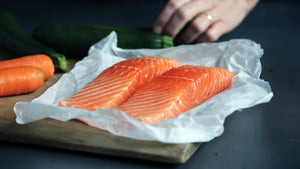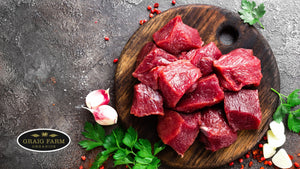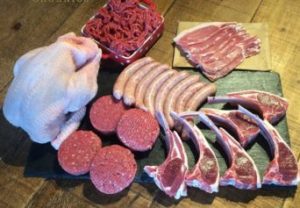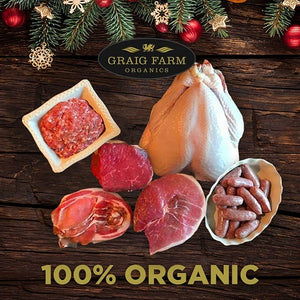What is Organic Meat?

Organic farming is all about working with nature to produce food in a sustainable way that’s better for animals, the environment and for us too. There are strict standards in place for organic farmers, which are regularly inspected by certifying bodies. These standards include the way animals are treated, their living conditions and their diets.
Many of the methods used in organic farming are very different from traditional agriculture. Avoiding chemicals that pollute soil and water, prohibiting growth-promoting drugs and managing pests naturally are some of the key distinctions between the two systems of farming.
Here are the key philosophies of organic meat farming.
Animal welfare
One of the most fundamental differences between organic and non-organic meat is how animals are reared. On factory farms, animals live in overcrowded, unsanitary conditions which cause a whole raft of health problems. Animals that are crammed together, mutilated without anaesthetic and fed poor diets aren’t happy or healthy. And as a result, the end product tends to be of a lower quality than organically reared meat.
However, organic farming requires a high standard of animal welfare. Livestock must be housed in a more spacious environment with regular access to outdoor pasture. Being able to forage, socialise and express their natural behaviours is essential for their well-being. When they’re able to exercise and live in a stress-free environment, they’re much happier and healthier.
In addition, organic livestock must have nutritious diets, and animals such as cattle must be grass-fed. Organic feed for animals cannot contain GMOs or animal by-products, and routine antibiotics and growth hormones are strictly banned too. Because of the animals’ healthier lifestyles, organic meat tends to be leaner.
Additives and preservatives
Additives are essential in meat production as they prevent the growth of harmful bacteria and keep it fresher for longer. They also enhance flavour and texture and give meat its pink colour. However, some chemicals that go into meat can have downsides, such as aggravating symptoms of asthma and allergies and causing migraines.
Organic meat contains many natural flavourings such as thyme, rosemary and pepper. Organic farmers aim to minimise chemical input, using the “nothing added, nothing taken away” ethos.
Chemicals
Many chemicals can indirectly find their way into non-organic meat because of differences in production. Before reaching the supermarket shelves, conventionally reared animals are exposed to pesticides. Their diets consist largely of genetically modified crops like soya, which are heavily treated with pesticides. Studies have shown that traces of these linger in the end product we buy from the shops.
As well as this, some factory farmed animals like cows are given hormones to speed up growth and these artificial hormones can make their way into our food supply. Animals are also routinely treated with antibiotic drugs to prevent outbreaks of disease. Treating them excessively with antibiotics may contribute to antibiotic resistance in humans.
Growth-promoting drugs and routine antibiotics are banned in organic farming, and alternative methods of pest control are used to minimise exposure to these chemicals.
Traceability
Many people are concerned about food traceability and care about where their food comes from. Organic farming strives to be transparent, and there’s a registered, documented and inspected trail from "farm gate to dinner plate" which you don’t always get with non-organic food.
Here at Graig Farm Organics, we’re specialist meat producers and butchers. Our range of organic produce includes high quality beef, chicken, pork, lamb and more. Are you ready to go organic?
- Tags: FAQs Organic Food
- Graig Farm





